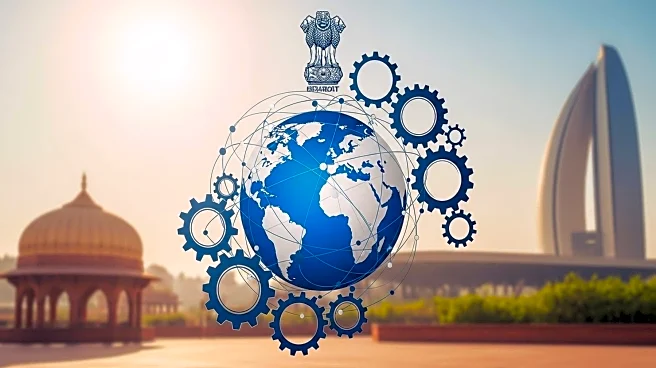What's Happening?
External Affairs Minister S Jaishankar presented Bharat's strategic vision at the United Nations General Assembly, emphasizing self-reliance, self-defense, and self-confidence as key pillars. These principles are central to Bharat's approach to addressing modern global challenges and enhancing its role on the international stage. Jaishankar highlighted Bharat's initiatives in manufacturing, peacekeeping, and international collaboration, urging nations to mediate conflicts in regions like Ukraine and the Middle East to foster global peace and stability. He also advocated for reforms within the UN to make it more representative and underscored Bharat's readiness to assume greater responsibilities. Jaishankar called for international unity and empathy to navigate current global disruptions, stressing the importance of avoiding political and economic pressures.
Why It's Important?
Bharat's emphasis on self-reliance and global cooperation reflects its growing influence and ambition on the world stage. By advocating for UN reforms and increased international collaboration, Bharat positions itself as a proactive player in global governance. This approach could lead to more balanced international relations and potentially reduce geopolitical tensions. Bharat's call for mediation in conflict zones like Ukraine and the Middle East highlights its commitment to peace and stability, which could have significant implications for global security. The focus on self-reliance also aligns with Bharat's domestic policy of Aatmanirbharta, aiming to boost economic independence and resilience against external pressures.
What's Next?
Bharat's push for UN reforms and increased responsibilities may lead to discussions and negotiations within the international community. Countries may respond to Bharat's call for mediation in conflict zones, potentially leading to diplomatic initiatives aimed at resolving ongoing hostilities. The emphasis on self-reliance could result in further domestic policies to strengthen Bharat's manufacturing and technological capabilities, impacting global trade dynamics. As Bharat continues to advocate for international unity, it may seek alliances and partnerships that align with its strategic vision, influencing geopolitical alignments.
Beyond the Headlines
Bharat's strategic focus on self-reliance and global cooperation may have long-term implications for its foreign policy and international relations. The call for UN reforms could spark debates on the effectiveness and representation of global institutions, potentially leading to shifts in international governance structures. Bharat's emphasis on avoiding political and economic pressures highlights the ethical dimension of its foreign policy, promoting a more equitable and empathetic approach to global challenges. This strategy may also influence cultural perceptions of Bharat as a leader in advocating for peace and stability.











